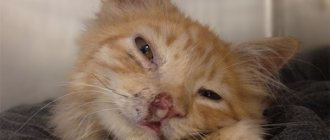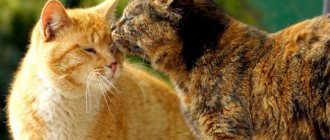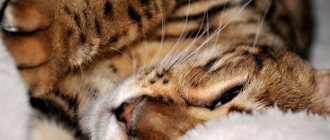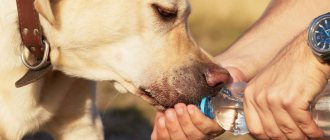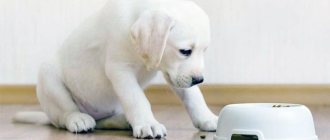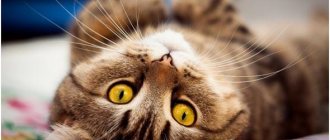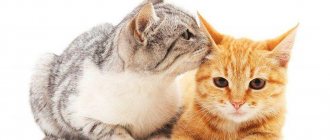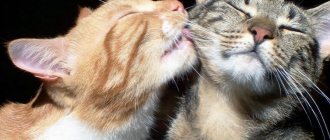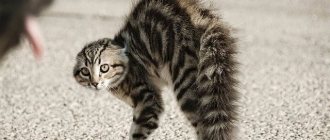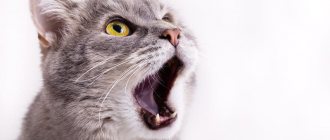Sometimes it happens that a cat refuses food and water. This behavior can be alarming, especially if the pet has been eating well before. The cause can be both harmless provoking factors and serious diseases that require complex treatment. If your pet continues to refuse food and water, this is a rather alarming sign.
- 2 What diseases can cause
2.1 Reasons for refusing food - video - 2.2 When you can’t put off visiting a doctor
- 3.1 What to do if your pet doesn’t eat, doesn’t drink and constantly sleeps
Why doesn't my cat eat or drink for several days?
A pet may refuse food and water for a number of reasons. The most common reason is poor health. This is possible under stress, which is associated with a sudden change in environment, renovations, noisy parties, etc. Cats are very sensitive to any changes, so the body can react in a similar way.
In some cases, the problem is caused by unpalatable food. If there is a sudden change in diet, the pet may not react to this in the best way. Especially if the food is cheap and of poor quality. In this case, the problem can be solved very simply - you need to return to your usual diet.
A stressed cat may not eat or drink for several days.
Kittens may refuse food and water due to gastrointestinal disorders. The fact is that a small pet has a weak immune system, and any error in the diet can provoke digestive disorders, which are accompanied by poor appetite and loose stools. Additional factors: subcutaneous ticks, fleas and other parasitic infections.
Attention! If the pet does not want to eat or drink, then first of all you need to look at the fur and skin, which should be normally clean. Then you need to pay attention to the cat's nose. If it is wet, then the temperature is within normal limits.
A sick animal may refuse food and water during the period of exacerbation of the inflammatory process, as the body fights the pathology. Such abstinence from food often does not exceed several days. Additionally, your pet's body temperature may increase. After the fever disappears, appetite is quickly restored. In this case, it is important to clarify what disease caused the symptoms.
A sick cat is often lethargic and refuses water and food.
An old cat may lose its appetite due to inflammatory diseases of the urinary system. Gradually, the animal accumulates salt crystals in its urine (this is associated with an abundance of sodium in dry food), which provokes the formation of stones that can clog the urinary ducts. An additional reason is inflammation of the gums, since the teeth of an old pet often crumble and fall out, which contributes to the occurrence of periodontitis, gingivitis and other similar pathologies.
Old cats are often susceptible to inflammatory gum disease
One of the common reasons for loss of appetite and refusal to drink water is poisoning. This can happen at any age. A cat can be poisoned by some kind of chemical by licking it from the floor, as well as by poisonous plants, stale food, and insects. Intoxication is often accompanied by refusal of food, water, fever, loose stools and vomiting.
Another reason why your pet suddenly began to refrain from eating could be a foreign body stuck in the throat. At the same time, the animal behaves strangely, hides, vomits, and the cat may also wheeze while trying to push the object out.
Main factors for food refusal
As we have already said, refusing food is not always a reason to immediately raise the alarm. So, if she refuses to eat, this does not mean that she is terminally ill. It is quite possible that the animal simply does not want to eat. The fact is that older animals have a very slow metabolism.
(i.e. metabolism), as a result of which the need for nutrients is also low.
You need to be wary only if the fast lasts for a very long time, and the cat, in addition to food, also refuses water
.
All of these could indicate serious problems with and(). This is often indicated by a change in the color of the skin (more precisely, its yellowing), signs (foaming at the mouth), etc. The latter is typical, among other things, for uremia. If you observe any of this in your pet, take him to the vet immediately. Alas, in many cases, an old cat’s refusal to feed indicates that the animal senses the approaching disease
. You can't argue with age...
Also, the physiological reason for refusing to feed is.
When a pregnant cat refuses to eat, she is clearly preparing to become a mother. This is also indicated by her restless behavior, meowing and constant rushing around the house. The animal is looking for the most suitable for the birth of kittens. There's simply no time for food here.
Postoperative period
– a very difficult and responsible time. If, for example, after a cat, this is not surprising. It’s just that the pet’s body has not yet recovered from the effects of general anesthesia, the animal is still too weak to absorb food. But it is normal to refuse food only for a couple of days, and the pet should drink normally during this time.
What diseases can cause
The following diseases can provoke loss of appetite and refusal of water in cats:
- malignant tumors - can be asymptomatic for a long time, most often affecting old animals, which at the same time begin to rapidly lose weight and prefer a sedentary lifestyle;
- renal failure - can occur in a pet at any age, while the cat rarely goes to the toilet, urine is excreted in small quantities;
- helminthic infestations are a common cause of loss of appetite in an animal at any age; in addition, symptoms such as stool disorders, weight loss, hair loss, vomiting, etc. are often present;
- fungal diseases - accompanied by deterioration of appetite, refusal of water, hair loss, skin rashes, itching and a general unsatisfactory condition in which the cat refrains from active games;
- intestinal obstruction - can be the result of stuck hairballs, helminthic infestation, while the pet does not go to the toilet and tries to hide.
Fungal diseases in cats can cause loss of appetite
Cats may refuse food and water during estrus, which is associated with hormonal changes in the body. As a rule, appetite is restored within a few days.
A friend’s cat suddenly lost his appetite and drank very little. At first she thought it had something to do with the extreme heat. Then the cat began to hide and lost a lot of weight. When I came to visit her and called my pet, he came out of hiding. He was terribly thin and could barely sit. Suddenly I discovered a sore on his withers and a lack of hair in this place. She advised me to immediately contact a veterinarian, as I suspected the presence of a tick. I recommend carefully examining your pets if their appetite worsens and they refuse water. Provoking factors are not always as harmless as they may seem at first glance. Now the cat has almost fully recovered, but long-term therapy is still required.
Reasons for refusing food - video
When you can't put off visiting a doctor
If within three days the cat’s appetite is not restored and it refuses to drink, then it is necessary to urgently consult a doctor, as the risk of dehydration is high. It is also important to visit a specialist if your animal has the following symptoms:
- vomit;
- hair loss;
- rash;
- loose stools;
- elevated temperature;
- weakness.
Attention! Owners should be wary if their pet hides all the time and avoids contact. This may indicate a severe pathological process in the body.
Diabetes
Cats, like people, have elevated blood sugar levels. This does not occur too often, but such a disease requires increased attention and timely treatment.
Reasons: monotonous, poor nutrition and lack of exercise. Diabetes most often affects animals whose activity is limited to the walls of a city apartment. You should watch neutered cats especially carefully - their pancreas function is often impaired due to excess weight.
Treatment of diabetes is a very complex and painstaking process, so not all owners are ready for it. Some prefer not to torture the animal, but to euthanize it.
If the diagnosis is confirmed by a specialist, then long-term treatment begins. It includes insulin injections and a special diet. You constantly need to measure your sugar level (about once every 2-3 hours). So the doctor prescribes an individual dosage and course of therapy.
If the measures prescribed by the doctor are followed, the cat can fully recover and live a long, fulfilling life.
How and how to help an animal
If a cat refuses food and water, then the first thing to do is take your pet to a veterinarian. It is not possible to make a diagnosis on your own at home, so you need to call a doctor at home or take your pet to the clinic.
If it is impossible to get to the veterinarian in the next 24 hours, then you need to provide the cat with rest. To do this, you should prepare a clean litter; it should not be too soft or too hard. If an animal is hiding, you should not force it out of its hiding place. You can only place a bowl of food and fresh water nearby.
Bowls of water and food should always be available to the animal.
Under no circumstances should you try to give your pet any medications without first consulting a doctor. Otherwise, you can only cause harm and provoke life-threatening consequences.
If the doctor has determined the cause, then you should follow the specialist’s recommendations and give medications according to instructions in the required dosages. This must be done calmly; you must not cause pain to the animal. Before giving medication, the cat needs to be stroked, and the tone of voice should be calm. This way, the pet will tolerate the treatment better, will not resist too much and will recover faster.
Additional recommendations:
- If the cause is stress, then the cat should be left alone for a while. It is advisable to call her to eat in a gentle tone. A calm and quiet environment, the absence of extraneous noise and periodic stroking will help you recover from stress.
- If your pet doesn't like the food, you need to replace it as soon as possible. It is recommended to give preference to balanced foods rather than cheap options containing a lot of harmful additives.
- In case of gastrointestinal upset and poisoning, you can give the animal activated charcoal (500 mg per 1 kg of weight). In this case, the tablet must be crushed and dissolved in 1 tsp. water. It is most convenient to give medicine using a syringe without a needle. It is enough to do this procedure once before seeing a doctor.
- Ticks and fleas are eliminated using special antiparasitic medications. You should not use them on your own; you should first consult your doctor. However, if this is not possible in the near future, and the animal has fleas or a tick is found, you can purchase Bars or Celandine shampoo.
- If the cause is helminthic infestations, then treatment is carried out with the help of anthelmintic drugs. The medication should be given only according to the regimen recommended by the doctor. Otherwise, larvae may remain, which will provoke a relapse.
- To alleviate the condition of an animal with gum inflammation, you can use a solution of Miramistin or potassium permanganate. It is necessary to treat the gums using a cotton pad and the selected product. This needs to be done 2 times a day. Do not press on problem areas.
A weak solution of potassium permanganate can be used to treat inflamed gums
What to do if your pet doesn’t eat, doesn’t drink and constantly sleeps
If an animal does not eat or drink, and also sleeps constantly, then this is an alarming signal of serious health problems. However, in extremely rare cases this is associated with stress. In this case, the pet should be left alone and allowed to rest. There is no danger in inactivity after stress. If the animal is lethargic, does not eat or drink for another reason, then postponing a visit to the doctor is dangerous, since with a serious pathology the cat may die.
Some recommendations that will help you hold out until the doctor arrives:
- It is necessary to ensure that fresh air enters the room.
- Do not disturb the pet. If there are other animals in the house, then for safety reasons it is better to isolate them from contact with the sick cat.
- Make sure the water in the bowl is always clean.
- If there is a special medicinal herb for cats in the house, which breeders often grow in pots, then you can pick a little and put it next to your pet. If desired, the animal can be treated with such a safe remedy.
Attention! If a cat does not drink for more than 24 hours, it can cause death. In this case, water must be injected forcibly using a thin syringe without a needle, gradually pouring it into the mouth.
How to help a kitten
If the kitten does not eat anything or drink water, then first of all you need to pay attention to the nature of the food. Small pets need special soft food. It is impossible to give a kitten food intended for adult animals, since the gastrointestinal tract of babies is still very weak. Long-term refusal of water is dangerous, so you can give your pet water using a pipette. Every hour you need to give water forcibly. The liquid should be administered in small quantities - one pipette at a time is enough.
Giving your kitten water using a pipette will prevent dehydration
In addition, the kitten should be carefully examined for rashes, sores and fleas. Particular attention should be paid to the withers and ears. If everything is clean, then most likely the problem lies in the functioning of the internal organs, which can only be determined in a clinical setting.
Attention! If a kitten has a sore in the withers area, under no circumstances should you burn it with iodine or brilliant green. This may indicate the presence of a mite or lichen. In this case, you need to undergo the necessary tests and isolate children and other animals from contact with the kitten until complete recovery.
Other situations
Problems with the reproductive system
Animals have great difficulty undergoing the rehabilitation period after castration or sterilization. More often than not, they simply hide in a distant dark corner and lick their wounds there. There is no need to disturb them in this state.
All that is required is to place the litter tray close and provide fresh drinking water.
The same rules can be applied to the period of the first heat in a young cat.
Stress
In the lives of our tailed friends, there are also difficult days, and even prolonged depression.
It can be provoked by:
- moving;
- parting with a beloved owner;
- separation of kittens from their mother (in this case it will be difficult for both the kittens and the cat itself).
If you notice that your cat is sad all the time, shows no energy and mostly sleeps, then you need to let her come to her senses. For a day or two, she may well arrange a fasting day for herself.
If food intake does not begin on both the third and fourth days, you should be concerned about the animal’s condition and start feeding it, at least through force.
Prevention measures
Prevention rules that will help avoid problems:
- Make sure water and food bowls are always clean.
- Include only high-quality food in your pet's diet.
- Try not to expose your cat to stressful situations.
- Brush the coat regularly. This must be done using a furminator. This procedure will prevent the accumulation of hair in the cat’s gastrointestinal tract after licking.
- Eliminate the presence of cockroaches in the house, which can carry serious infections.
- Protect your pet from contact with street animals.
- Regularly wet-clean the floor.
- Do not give your cat any medications without consulting a doctor.
- Deworm your pet once every 4–6 months.
To protect your animal from a number of diseases, it is recommended to keep outdoor shoes in the closet. This is important to prevent the cat from coming into contact with bacteria that can easily be carried home on the soles.
If a cat loses its appetite and feels unsatisfactory, then there is no need to try to cure it at home. If the provoking factor is not serious and does not pose a threat to life, then the pet will recover in the next 24–48 hours. When this does not happen, you should immediately consult a doctor.
Gastrointestinal diseases
Problems with the gastrointestinal tract in cats are determined by the following signs:
- vomit;
- diarrhea;
- discharge containing mucus;
- bloating;
- hard and tense stomach;
- strong odor from the mouth.
Among the most common problems is gastritis or the accumulation of hair in the stomach.
It’s not difficult to deal with a hairball: drinking plenty of fluids and special medications that help remove hair from the stomach will solve this problem (for example, “Phytomins”).
But gastritis is somewhat more complicated; its treatment requires time and effort. At the initial stage, it is necessary to give the cat boiled water and rice water. Then they use activated carbon diluted in water and medications prescribed by the doctor (most often these are stomach drops, Almagel). Food should be low-fat and exclusively unsalted.
What does it mean for a pet to refuse food and drink?
There are situations when a cat does not eat or drink for several days, but only sleeps for no reason. If a cat does not eat and therefore loses its appetite, this can be called anorexia. However, an animal's appetite is determined by psychological factors, unlike hunger, which is a physiological phenomenon.
There can be many reasons why a cat does not eat for several days and only sleeps. Often, a kitten does not eat because some harmful processes have begun in its body, that is, a disease is emerging. As a rule, if a cat is lethargic, does not even drink water for a long time and lies in one place for most of the day, then this indicates diseases of the stomach or other main organs. After all, when experiencing severe pain, the animal will not have time to eat.
Note that if the pet is very lethargic during the day and does not even drink water, this may indicate the first heat. Owners think their pet is sick, but this is not the case. In this case, the animal begins to get acquainted with new natural urges, and this can lead it to confusion. This behavior and refusal of water and food may subside within a few days and then return to normal.
If the kitten does not eat anything for a long time and does not even drink water during the day, he is lethargic and does not want to do anything, then your pet is probably sick. Often infectious diseases such as worms are the cause of lack of appetite. To prevent your pet from losing weight and becoming lethargic, it is necessary to give him preventive medications against parasites from time to time.
Below is a list of common diseases among indoor cats. If the cat does not eat anything for a day or several days, is very lethargic and only lies in one place, plus he has also lost weight, then the pet is sick. But what infection is causing this? Let's try to figure it out.
- If your cat has lost weight, it is likely that she has gastrointestinal diseases. The usual illness is accompanied by diarrhea and other unusual discharge. Only a veterinarian can make a more thorough diagnosis.
- This may also indicate liver disease. If the cat is sick, then you need to go to the doctor, and for the future - create a diet that would cleanse this organ.
- Pancreatic diseases. Sometimes a cat does not eat precisely because of this disease.
- Diseases of the reproductive system.
- Blood diseases.
- In addition, this can be caused by various diseases of the mucous system, that is, the throat, nose, mouth, and so on.
But if a cat doesn't eat, it doesn't mean it has one of these diseases. If your pet has lost weight, this may well be due to the fact that he:
- I don’t like the new food (the diet needs to be changed);
- a new place of residence (over time, the cat will adapt, you can help him with this: veterinary stores often sell appropriate medications that help animals when moving);
- other causes of stress (it is necessary to identify specific causes of stress).
If your cat doesn't eat during the day, it's not a big deal. But if this trend continues for a long time, then the pet must be taken to the doctor. It is necessary to take into account some nuances. If you are worried about your pet’s health and don’t know how long it can go without food, consider the following:
- A young and healthy cat can go without food for at least five days, and this will not harm him in any way. After this period, the body will be replenished with the necessary vitamins and carbohydrates and the cat will feel normal again.
- If the cat is already at an advanced age and has stopped eating, then it can go without food for about three days without harm to its health. As in the previous case, after this his body will be filled with vitamins. If the reason for such a diet is not a disease.
- If the kitten is small and has not eaten all day, then it may die of hunger. A small and fragile organism can survive without food for about a day, in rare cases - a little more. Therefore, kitten owners need to immediately sound the alarm if their pet does not eat for at least half a day.
- If you know that the cat suffers from chronic diseases, then you should not let her starve for a long time. Regardless of the stage of manifestation and degree of the disease, a sick pet should not fast for more than two days.
Unfamiliar food or dirty bowl
The beloved fold-eared pet with a good-natured face and a trusting look suddenly began to refuse his favorite treats. Atypical behavior for pets makes the owner nervous. Naturally, every caring owner tries to find out why a domestic kitten is not eating.
The worst thoughts immediately come to mind, and we intuitively run to specialists for help. However, there is no need to rush; it is necessary to exclude all possible reasons that could cause a change in the appetite of a furry family member.
Pets develop taste preferences over time. They quickly get used to their daily diet and do not always give in to experiments involving a sudden change in diet. If you have recently changed your pet’s usual food to a new composition, your cat may refuse to eat on principle, showing his dissatisfaction. Loss of appetite can also occur due to the introduction of new foods into the diet.
So, unfamiliar food is one of the reasons why a furry family member may go hungry for several days. If the food remains the same, look into your pet's bowl to see if there are leftovers from the previous meal or poorly washed edges.
A clean animal may refuse food after smelling the unpleasant smell of rotting remains. Take care of the hygiene of dishes for your pet. A dirty bowl can not only affect his appetite, but also provoke the development of certain diseases.
